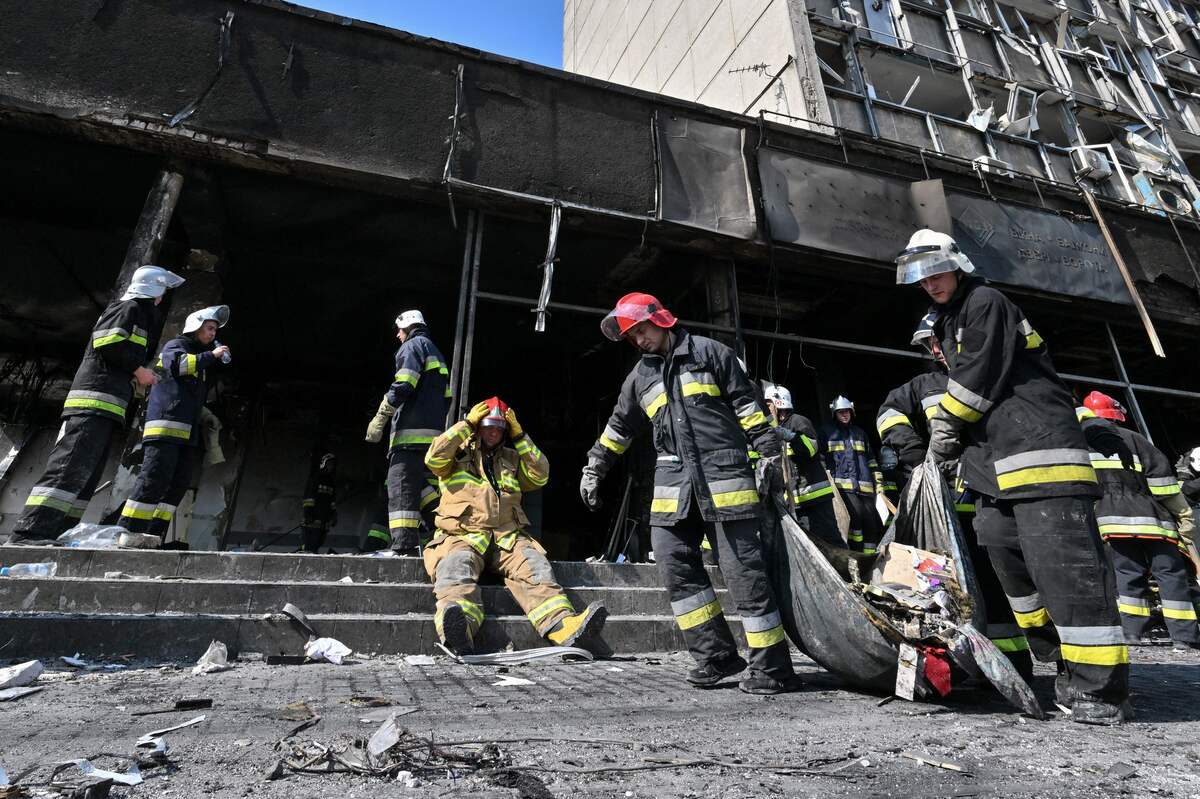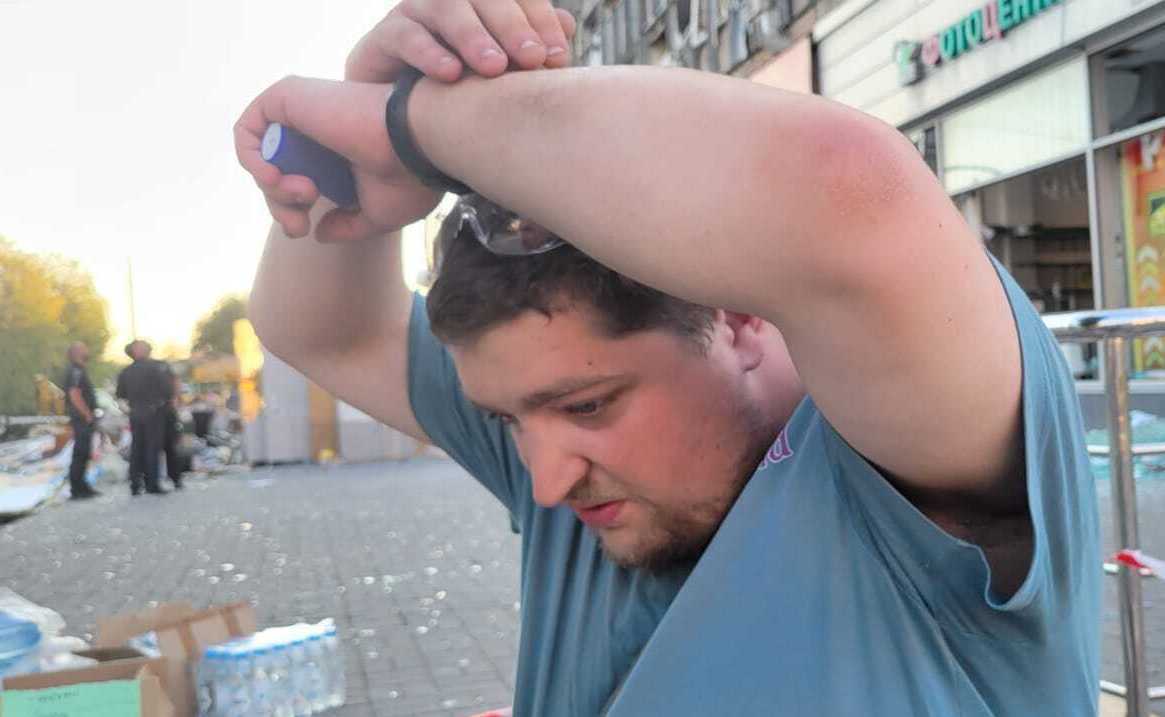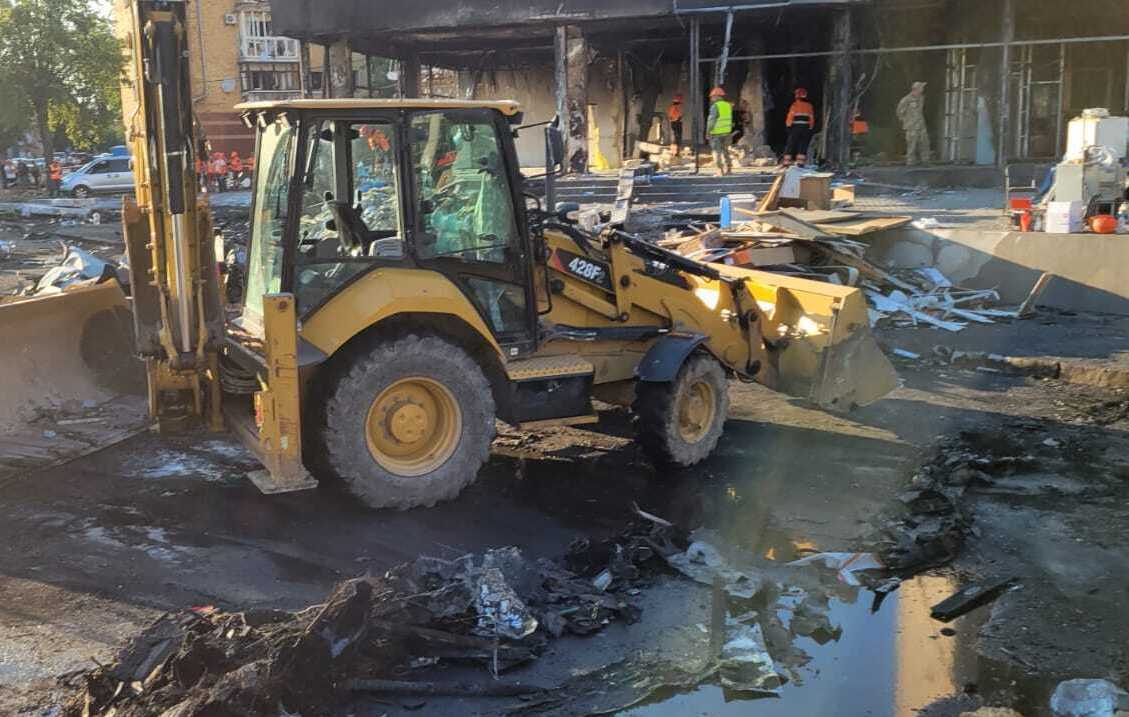[ad_1]

Firefighters remove rubble following a Russian airstrike in the central city of Vinnytsia on Thursday that Ukrainian officials said killed more than 20 people and injured dozens more.
Sergei Supinsky/AFP via Getty Images
hide caption
toggle caption
Sergei Supinsky/AFP via Getty Images

Firefighters remove rubble following a Russian airstrike in the central city of Vinnytsia on Thursday that Ukrainian officials said killed more than 20 people and injured dozens more.
Sergei Supinsky/AFP via Getty Images
VINNYTSIA, Ukraine — Oksana Urbanska walked through the rubble in the center of her native city Thursday, voicing fury at what she described as a deliberate strike against civilian buildings, including a medical clinic and local shops.
“You can see for yourself, this is where regular people were living,” said Urbanska, who works for the State Emergency Services of Ukraine, the organization coordinating rescue operations in Vinnytsia. “There is a baby who died. She and her mom were walking to a school for little kids. There is no military value or object here.”
Maksym Budko was one of the civilians in the square when the Russian cruise missiles struck. At least 23 people were killed, including three children, and dozens more were sent to the hospital, the regional emergency service department said.
“I was there using the ATM,” Budko told NPR. “I heard the whistle, then I heard an explosion. Everything started falling and flying. I got up and covered my head, then I heard the second blast.”
Late Thursday, rescue crews were still digging through rubble. Ukrainian officials said more than 40 people were still unaccounted for.

Maksym Budko demonstrates how he covered his head after being thrown to his knees by the blasts of two cruise missiles that struck as he was using an ATM in Vinnytsia.
Brian Mann/NPR
hide caption
toggle caption
Brian Mann/NPR

Maksym Budko demonstrates how he covered his head after being thrown to his knees by the blasts of two cruise missiles that struck as he was using an ATM in Vinnytsia.
Brian Mann/NPR
The attack on this small city, a hub for humanitarian efforts and home to the headquarters for Ukraine’s tiny air force, has shattered the sense of safety here.
The strike involved at least three Kalibr cruise missiles launched from a Russian submarine in the Black Sea, said Serhiy Borzov, the Vinnytsia regional military administrator.
While one of the buildings hit Thursday is sometimes used by the Ukrainian military for ceremonial events, local officials said it was most often used for theater performances and religious services.
Yuri Ignat, a spokesman for Ukraine’s air force, told NPR that none of the structures damaged had any military or strategic value.
“Russians don’t just want to force the government of Ukraine to surrender,” Ignat said, as he stood in his military fatigues next to the bombed-out buildings. “They also want to force the Ukrainian people to surrender. They want to break us down. But after what they did here, no one is going to surrender.”
As the strike hit, allies were in the Hague to discuss war crimes
Thursday’s attack came as representatives from more than 40 countries, along with officials from the U.N. Office of Human Rights and the International Criminal Court, had traveled to The Hague to coordinate war crimes investigations in Ukraine.

Rescue and clean-up crews scrambled late Thursday to search for victims of the Russian cruise missiles and to clear away debris in Vinnytsia.
Brian Mann/NPR
hide caption
toggle caption
Brian Mann/NPR

Rescue and clean-up crews scrambled late Thursday to search for victims of the Russian cruise missiles and to clear away debris in Vinnytsia.
Brian Mann/NPR
“Residential buildings were destroyed, the medical center was on fire. Cars and trams were on fire. This is an audacious act of Russian terror,” said Ukrainian President Volodymyr Zelenskyy, speaking to the gathering by video link. “People couldn’t do that. They are beasts.”
Zelenskyy went on to urge “mandatory and principled punishment for all Russian criminals.”
The International Criminal Court’s top prosecutor, Karim A. A. Khan, said, “At a time like this, the law cannot be a spectator. The law cannot recline in comfort in the Hague, or anywhere else for that matter, when it is meant to protect and uphold certain principles that are essential for humanity. Meaningful justice can only be achieved if we work together.”
The group — comprised of the United States, members of the European Union, Canada, the U.K., Mexico and Australia — pledged 20 million euros to support investigative efforts by the ICC, Ukraine’s prosecutor general and the United Nations. The ICC opened an investigation into war crimes in Ukraine soon after Russia invaded in February.
On Wednesday, U.S. Secretary of State Antony Blinken condemned what he described as a Russian operation to forcibly deport Ukrainian citizens to Russia. At least 900,000 Ukrainian citizens have been removed from their homes, “often to isolated regions in the Far East,” he said.
“President Putin and his government will not be able to engage in these systematic abuses with impunity. Accountability is imperative,” Blinken said. “The United States and our partners will not be silent. Ukraine and its citizens deserve justice.”

At least 23 people were killed in the strike Thursday, Ukrainian authorities said.
Sergei Supinsky/AFP via Getty Images
hide caption
toggle caption
Sergei Supinsky/AFP via Getty Images

At least 23 people were killed in the strike Thursday, Ukrainian authorities said.
Sergei Supinsky/AFP via Getty Images
Ukraine says Thursday’s strike is part of a pattern
Ukrainians say the strike in Vinnytsia is part of a pattern of attacks on civilian targets with no military significance: In March, a theater in Mariupol where civilians were sheltering from bombs; in April, a train station in Kramatorsk that was filled with travelers when a missile struck; just last month, a mall in Kremenchuk where more than 20 people were killed.
Humanitarian groups, including the U.N. and Amnesty International, have documented witness accounts and other evidence of executions and sexual assaults by Russian soldiers in Ukrainian cities like Bucha.
More broadly, the Russian invasion has devastated civilian buildings and infrastructure around the country. Russian forces have repeatedly turned to siege tactics, encircling cities like Chernihiv, Kharkiv and Mariupol, subjecting them to relentless shelling. Airstrikes regularly hit cities far from the front lines.

Clean-up crews work with shovels and picks as well as heavy equipment after missile strikes heavily damaged buildings in a civilian area of downtown Vinnytsia.
Brian Mann/NPR
hide caption
toggle caption
Brian Mann/NPR

Clean-up crews work with shovels and picks as well as heavy equipment after missile strikes heavily damaged buildings in a civilian area of downtown Vinnytsia.
Brian Mann/NPR
Russia has repeatedly denied its involvement in war crimes and says it aims its strikes only at military targets as part of what it has called a “special military operation.”
Ukrainian officials say tens of thousands of civilians have died so far in the war. That number is difficult to verify due to the ongoing violence. The U.N. has recorded at least 5,000 civilian deaths but believes the actual figures to be significantly higher.
Brian Mann reported from Vinnytsia, Ukraine; Becky Sullivan is based in Washington, D.C. Additional reporting by Dmytro Liashko in Vinnytsia.
[ad_2]
Source link




